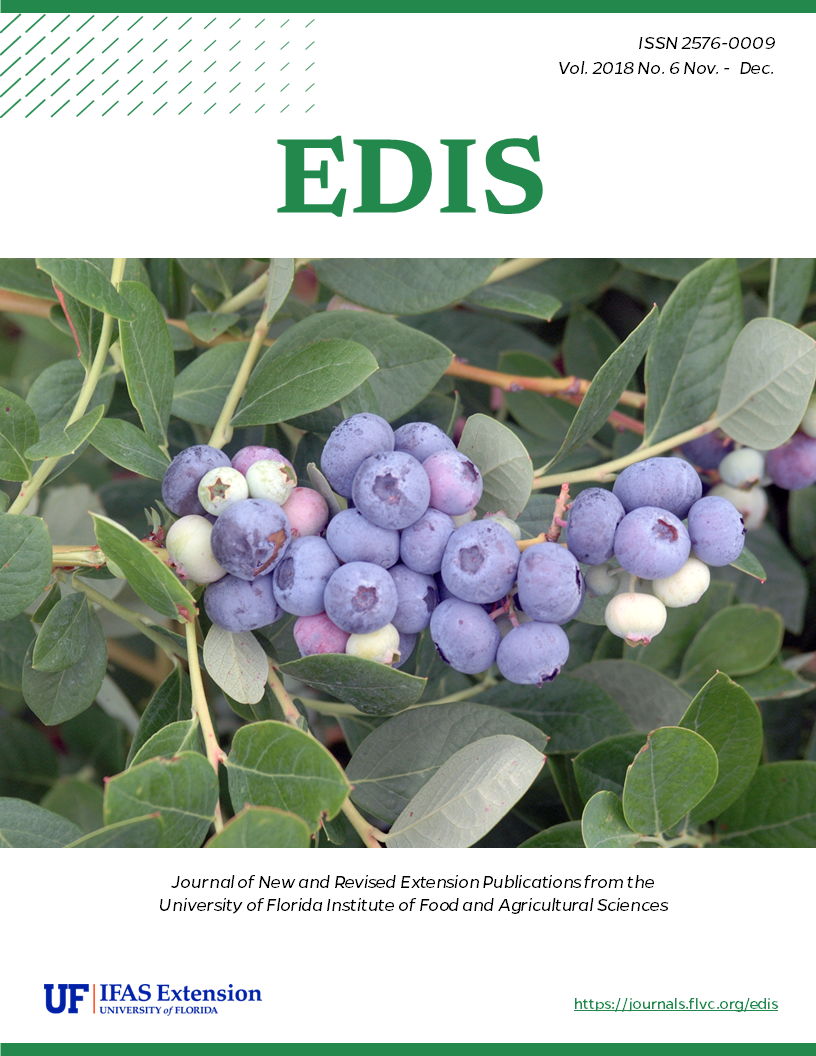Abstract
Rootstocks have been used in many tree fruit systems to provide growth advantages and/or pest and disease resistance without affecting (or sometimes improving) productivity and fruit quality. In Florida, stone fruit are grown on rootstocks that specifically provide resistance to the peach root-knot nematode, Meloidogyne floridensis (Handoo, et al., 2004; Sherman, et al., 1991). Although several root-knot nematode-resistant rootstocks are available for stone fruit grown in other locations and climates, ‘Flordaguard’ peach rootstock is currently the only rootstock recommended for stone fruit production in Florida.
Root-knot nematodes (M. incognita and M. javanica) have historically been the most important species of root-knot nematodes parasitizing peach in the southeastern United States peach industry. ‘Guardian’, ‘Nemaguard’, ‘Nemared’, and ‘Okinawa’ rootstocks are resistant to these species of nematode. However, in 1966 a new species of root-knot nematode was detected on ‘Nemaguard’ and ‘Okinawa’ peach rootstocks in Gainesville, Florida, and ultimately identified as M. floridensis in 2004 (Han-doo, et al., 2004). This nematode reproduces abundantly on ‘Nemaguard’ and ‘Nemared’ peach rootstocks as well as on other crops (verbena, eggplant, squash, basil, impatiens, tomato, snapdragon, dill, and certain ornamental plants) (Table 1). Consequently, ‘Nemaguard’, ‘Nemared’, and ‘Okinawa’ peach rootstock are no longer recommended for peaches, nectarines, and plums in Florida. ‘Nemaguard’ and ‘Nemared’ rootstocks had been used in north Florida for many years, but continued use may increase nematode populations to damaging levels on these rootstocks.
‘Flordaguard’ rootstock has better resistance to M. floridensis than ‘Nemaguard’ rootstock. Field evaluation of peach rootstocks to different root-knot nematode species indicated that after 25 months, nematode egg production was greater on ‘Nemaguard’ than on ‘Flordaguard’ rootstock (Nyczepir, et al., 2006). Longer-term observations in Florida also suggest that trees on ‘Nemaguard’ rootstock do not perform well in soils infested with M. floridensis. Accordingly, ‘Flordaguard’ rootstock is the only rootstock the University of Florida currently recommends for commercial peach production. ‘Sharpe’, a clonal plum hybrid rootstock (Beckman, et al., 2008), is only recommended for backyard fruit production because of its reduced yield and smaller fruit size when compared to trees budded onto ‘Flordaguard’ rootstock.
References
Beckman, T.G. 1998. Outcrossing in a diverse peach rootstock seed block. Fruit Var. J. 52:100-103
Beckman, T. G., J. X. Chaparro, and W. B. Sherman. 2008. "'Sharpe', a Clonal Plum Rootstock for Peach." HortScience. 43(7): 2236-2337. https://doi.org/10.21273/HORTSCI.43.7.2236
Beckman, T. G., J. X. Chaparro, and W. B. Sherman. 2012. "'MP-29', a Clonal Interspecific Hybrid Rootstock for Peach." HortScience. 47 (1):128-131. https://doi.org/10.21273/HORTSCI.47.1.128
Handoo, Z. A., A. P. Nyczepir, D. Esmenjaud, J. G. v. d. Beek, P. Castagnone-Sereno, L. K. Carta, A. M. Skantar, and J. A. Higgins. 2004. "Morphological, Molecular, and Differ-ential-Host Characterization of Meloidogyne floridensis n. Sp. (nematoda: Meloidogynidae), a Root-Knot Nematode Parasitizing Peach in Florida." Journal of Nematology. 36(1): 20-35.
Nyczepir, A. P., T. G. Beckman, and G. L. Reighard. 2006. "Field Evaluation of 'Guardian'™ Peach Rootstock to Different Root-Knot Nematode Species." Acta Horticulturae. 713: 303-309. https://doi.org/10.17660/ActaHortic.2006.713.44
Pusey, P. L. 2005. "Fungal Gummosis." In Southeastern Peach Growers Handbook. Athens: University of Georgia Press.
Sherman, W. B., P. M. Lyrene, and R. H. Sharpe. 1991. "Flordaguard Peach Rootstock." HortScience. 26(4): 427-428. https://doi.org/10.21273/HORTSCI.26.4.427
Unless otherwise specified, articles published in the EDIS journal after January 1, 2024 are licensed under a Creative Commons Attribution-NonCommercial-NoDerivs 4.0 International (CC BY-NC-ND 4.0) license.

